The Double Crossers (1976)
Directed by: Jeong Chang-hwa
Written by: Jeong Chang-hwa
Starring: Chao Hsiung, Chen Sing, Shin Il-ryong, Shirley Huang
AKA GUI JI SHUANG XIONG
HONG KONG
AVAILABLE ON BLU-RAY: NOW, fr0m EUREKA ENTERTAINMENT
RUNNING TIME: 95 mins / 93 mins
REVIEWED BY: Dr Lenera
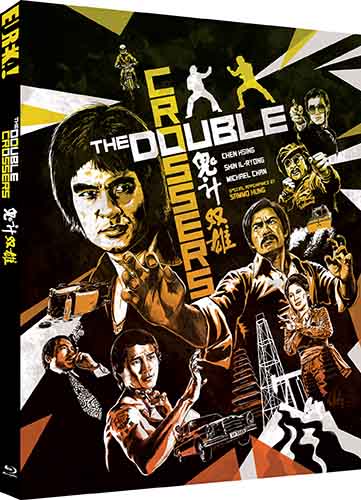
Tough Singapore detective Lung learns that his father has died. He was murdered, and what’s worse is that he left him a cassette tape that tells him that he was a criminal in league with a partner who betrayed him, and that the mother Lung never knew because she died in childbirth was also a criminal. Lung vows to honour the memory of his father by avenging his death, which first means resigning from the force, then going to Hong Kong where his father’s partner and killer Wang is now a big crime boss. Aiding him is another ex-partner of his father’s named Chen, whose former wife is now married to Chen….

Jeong Chang-hwa directed King Boxer, the film that began the “chop socky” craze in the United States, so he certainly has a place in the hall of fame, especially seeing as it’s a rather good movie too, but can anyone, unless they’re a true “expert”, name something else that he’s made – at least until Eureka Entertainment’s release of his The Skyhawk almost a year old? Yet now we have the same helmer’s The Double Crossers, which is so “obscure” that it doesn’t even have any “user” reviews on the IMDB. Eureka could have played up the fact that this seems to be a pretty rare film that’s having its official debut on digital media, but I assume by now that they know their audience, in addition to seemingly having an extensive contract with Golden Harvest. But is it a good movie? Well, it may disappoint some because the bits of martial arts are very brief up to the very end, but then it’s not trying to be a fight flick, despite having a fair amount of fighting martial arts talent in the cast. Instead, it’s aiming to be a crime / revenge thriller mixing action and plot with a serving of romance, while the guys on screen are often given opportunities to act, opportunities that are only sometimes squandered. And, while there are a few instances of sloppiness which always seem to stick out more in a present day-set movie, it generally succeeds in its aim. The action has considerable variety to it, while Chang-Hwa does try to write a script where you’re not always sure where things are going and where things can suddenly go off in a different direction. The stop-start pace is well pullex off for some of the time, though things really seem to slacken in the final third for a bit.
We open at nighttime at Singapore harbour, with a man accompanied by another picking a lock while somebody inside sits at a desk. After the latter gets up, he has his face slashed by a large knife, which seems to kill him – after which the intruder places the knife in one of his victim’s hands, then leaves. It’s a moody and atmospheric scene,though it could have had more impact, and slightly jars tonally with what follows. Now we get the credits which take place over various shots of Singapore, which is certainly a nice change from the norm such as Hong Kong. Lung is in the office where the killing had been committed, listening to the tape recording that his dad nicely left him.“I had two partners in smuggling, your mother wanted me to quit, but I loved her, wanted to gibe her a respectable life. When she became pregnant with you, I decided to do as she wished”. However, mother misscarriaged, which Lung blames on Wang, one of the two partners and certainly not the nice one, that one being Chen who gave the criminal life up and moved to Indonesia, while Wang stole lots of money and started a smuggling operation in Hong Kong. Wang kept threatening Lung’s dad, wbo finishes his message with “if they get me, you’re next. Chen is like a son to me, you can count on his help”. Lung looks forlornly at the outline of his father’s body on the floor, then we briefly flash back to mum and dad, though audio only, to when he was a child and the introduction of a whistled tune, before we return to the present day and get into our first proper bit of action, Chen being attacked and chased by two men as he leaves his house. Eventually the pursuit winds up in an alley. One of thee attackers swings a bat and knocks loads of scaffolding onto himself, a moment very similar to one in The Soy Who Loved Me the following year, the other is quickly dispatched by Lung who shows up to deliver a well placed kick. For better or worse, this is generally what we’re going to get in terms of this sort of thing, but for a considerable amount of time things are engaging enough for this not to be an issue.
Lung has to arrest Chen for fighting, despite Chen whistling the same tune [it’s a good job he remembered it] so Lung knows who he is, and telling him “these guys are the men who murdered your father”. Lung lies to his captain, saying to him that Chen said nothing so he had to let him go. “Times have changed, we have to stay within the law, you cant taker police matters into your own hands” says his boss, to which Lung replies, “I’ll do this as a civilian, but I have to do it”, which the captain doesn’t seem to mind very much. Lung and Chen journey to Hong Kong, where Wang is now the Godfather, “he always gets everything his own way”. Chen visits a man named Pai and both narrowly escape with their lives, leaping in speeded up motion just as a rocket from a bazooka hits the building – no, these particular assassins don’t mess about, nor are they bothered about being secretive, though this particular rocket does surprisingly little damage. We learn that Wang is now with Pai’s ex-wife Nancy, who seemingly went with Wang to spare Pai’s life, though they still sometimes meet up in secret, both still being in love with each other. Chen initially seems reluctant to wage war on Wang, but soon the two of them are off to steal a load of money from him, driving up on bikes behind the van which contains the money and fooling the people inside into getting out so they can take it over. A lot of what happens afterwards could have developed from this, but instead the film then focuses for a while on Pai and Nancy, the former being captured and subjected to a pretty vicious torture scene involving boiling water and a blowtorch, before the latter helps him escape. However, this part of the story also stops after coming to a supposedly dramatic end which isn’t as dramatic as it should be due to the handling.
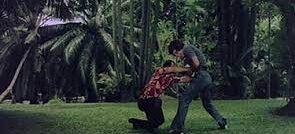
And then we’re off to Indonesia for the rest of the proceedings, our heroes determined to take down the gangsters despite a cop nosing around and Lung taking a shine to a woman named Renee who works in the hotel he’s staying at. Some will think that there’s more time devoted to the romance then there needs to be, though there’s a nice scene where, after some fighting, Lung tells her to wait in her room for him, which she goes and does, lying in bed for him because he obviously expects sex and she seems sadly resigned to it. However, when he comes in all he does is tell her to look after a suitcase for him. And I was more thinking about how the plan to take Wang down was absurdly complicated and too reliant on specific things happening. In any case there’s shooting, chases involving bikes, cars and vans, and even a version of the famous “art of fighting without fighting” scene in Enter The Dragon, with a bus taking the place of a boat. Il-Ryong takes down plenty of bad guys very quickly, Chan Sing as Chen often being sidelined, though he’s so cool that he’ll light a cigarette while also holding dynamite that’s close to his face. The brawls are very very short, often just consisting of a few moves. After one exchange of blows. Lung actually gives the hotel manager money to fix the railing he’s just damaged. How often do you see this, our hero paying for what he’s destroyed? If this kind of thing is referred to at all, it’s usually by exasperated police chiefs. The gang boss is played by Chao Hsuing, but he barely gets to fight at all, which I suppose makes sense since the character has a weak heart, a nice touch in the script. Wai-Man as his chief henchmen gets to do more, hitting, threatening and generally looking very evil while keeping his performance surprisingly muted. After having been on the same side as Sing in The Shaolin Plot, they briefly get to fight, but it’s Il-Ryong, who also tussles with bim earlier on, who gets the final fight with him, and despite still being quite short it’s well staged, while Sing gets to fight a few other heavies including Sammo Hung, sporting a moustache, a beret and John Lennon glasses.
The absence of a credited fight choreographer automatically leads us to assume that Hung did the honours, but his touch can only really be seen in the final reel, which also occasionally employs a bit of King Hu-type editing to suggest jumps. There’s some fine stunt work, most notably a guy falling down some hard stairs so hard that half way down he bounces up into the air before landing very hard indeed at the bottom – though one wonders why they couldn’t have beaten him for information in a room instead of doing such a public act, and the guy seems to recover very quickly too. As is often the case with these things, a few things are rushed or can only cause laughter due to the low budget. A tragic double death halfway through occurs almost offscreen and is never referred to again even though it’s of some importance. A guy on a bike is racing along but after doing a dramatic turn almost comes to a halt; the head of a crew member pops up to aid him. Nonetheless the film does well by its hero. “It may be the last thing I do but I’ll bust you, you son of a bitch” says Lung’s voice in voice-over, and the character is single minded and intense, yet seems to loosen up more and more as the film progresses. Il-ryong, who didn’t do that many films – his most visible role is probably in To Kill With Intrigue with Jackie Chan – and soon beccame a regular actor, but one can see how he would have been good at the latter because he really gives a rather good performance here. His slight resemblance as Bruce Lee is surprisingly not exploited anywhere near as much as you’d probably expect, considering the “Bruceploitation” fad that was in full sway at the time; he does a few Lee moves and that’s it. Jiang-Hwa generally does a good job, though it’s somewhat inconsistent; conventional shots are sometimes interrupted by unusual ones. Unfortunately wide shots are used rather too often, undermining the effect of some moments, though of course this means we can admire even more the lovely locations. Golden Harvest really tried to best the studio=bound approach of Shaw Brothers with this one.
Joseph Koo’s music score might be one of his best of the ’70s. There’s quite a diversity of themes and sounds, from the rousing main one to the tender love theme, from Blaxploitation funk to Indonesian percussion. Perhaps influenced by the Yakuza pictures coming from Japan at the time, The Double Crossers is a solid, well balanced crime thriller, and, despite what I said near the beginning of this review, may pleasantly surprise someone expecting little more than lots of fighting.
SPECIAL FEATURES
Limited edition O-Card slipcase featuring new artwork by Darren Wheeling
1080p HD presentation on Blu-ray of the original Hong Kong theatrical cut from a brand new 2K restoration
Aside from a few slightly blurry shots which can be out down to the distortion, especially on the edges of the frame, caused by the anamorphic frame, this looks just superb; the colours are quite saturated but suit the general look of the film and the ghastly ’70s fashions. The picture only has a few tiny speckles and contains a good amount of detail and depth within the image. Blacks are nice and deep. This restoration is as good as we can logically expect. Very impressive.
1080p HD presentation on Blu-ray of the original English language export cut from a brand new 2K restoration
This version only seems to shorten a few shots, it being notable that the English dub covers all of the Hong Kong dialogue, so the only major difference between the two is the endings are the same; in this cut our two heroes are not arrested at the end. The export version looks slightly less impressive; the hues pop out less and the image is a little bit softer. Nothing really to complain about though.
Original Mandarin and optional classic English dub (Hong Kong theatrical cut)
Classic English dub (Export version)
I had this on for most of the time. It’s often amusing, especially the cop with the camp voice. A few comparisons to the Mandarin soundtrack reveals that the English dub clarifies and even slightly expands some elements of the plot.
Optional English subtitles, newly translated for this release
Brand new audio commentary on the Hong Kong theatrical version by East Asian film expert Frank Djeng (NY Asian Film Festival)
This is one of Djeng’s best solo tracks in a while, the man perhaps energised by doing a film which is not much seen and therefore not much talked about. Of course there’s hardly any production information on it, but Djeng keeps things interesting by mentioning as much related – even only vaguely related [such as an airport closely surrounded by buildings which amazingly had no crashes] – stuff as he can, from pointing out and providing information about locations. to cast member Tutie Tirana going for an audition at age 10 and complaining that the script was different from the book it was based on. to the same guy, who plays a mob leader in the film, becoming a Triad boss for real! Djeng clearly likes the film but sees and points out flaws.
Brand new audio commentary on the export version by action cinema experts Mike Leeder and Arne Venema
Leeder and Venema always seem to take care not to repeat stuff that Djeng goes into – or is it the other way round? I reckon that there’s some communication involved. Their jokey banter as is fun as ever – it’s like watching the film with two very knowledgeable mates who may also be knocking back the liquor. Like Djeng, they present appreciation with a bit of light-hearted criticism, resight a few biographies, and even talk about the same airport, Leeder, leading as usual, saying that, actually, there was an accident where a plane ended up in the harbour for ages because China Airlines and the Hong ?Kong Airport Authority were arguing about who should move it. He also mentions doing a pre-interview meet with Sakana for a DVD with lots of interesting stuff but then a phone call caused Sakana to suddenly leave, and thinks that Sakana was the unlisted Indonesian producer, while Venema notices a poster of a girl above a urinal which also turned up in Queen’s Ransom, recalls being warned about sea snakes on an Indonersian beach [remember, he hates them], and is inclined to laugh even more than normal.
Reversible sleeve featuring original poster artwork
Trailer
A limited edition collector’s booklet featuring new writing on the film by James Oliver
Seeing as it’s never been available on home media before since video, it feels like Eureka have exhumed a lost film here. It’s flawed but should delight a lot of fans, while the two audio commentaries are typically good enough to compensate for there being no other special features. Recommended!




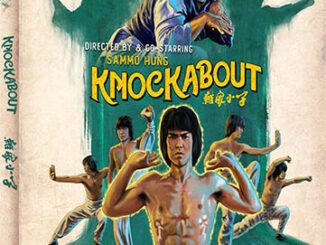
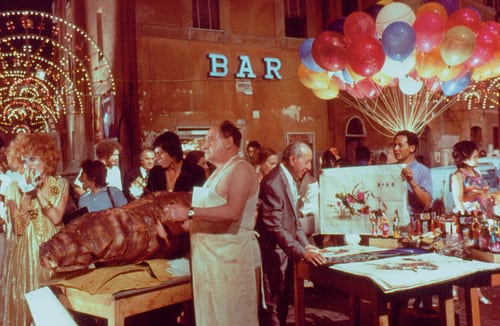
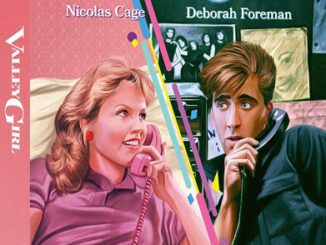
Be the first to comment